副词—语法知识梳理+专项集训及解析【中考英语仁爱科普版】(含答案和解析)
文档属性
| 名称 | 副词—语法知识梳理+专项集训及解析【中考英语仁爱科普版】(含答案和解析) | 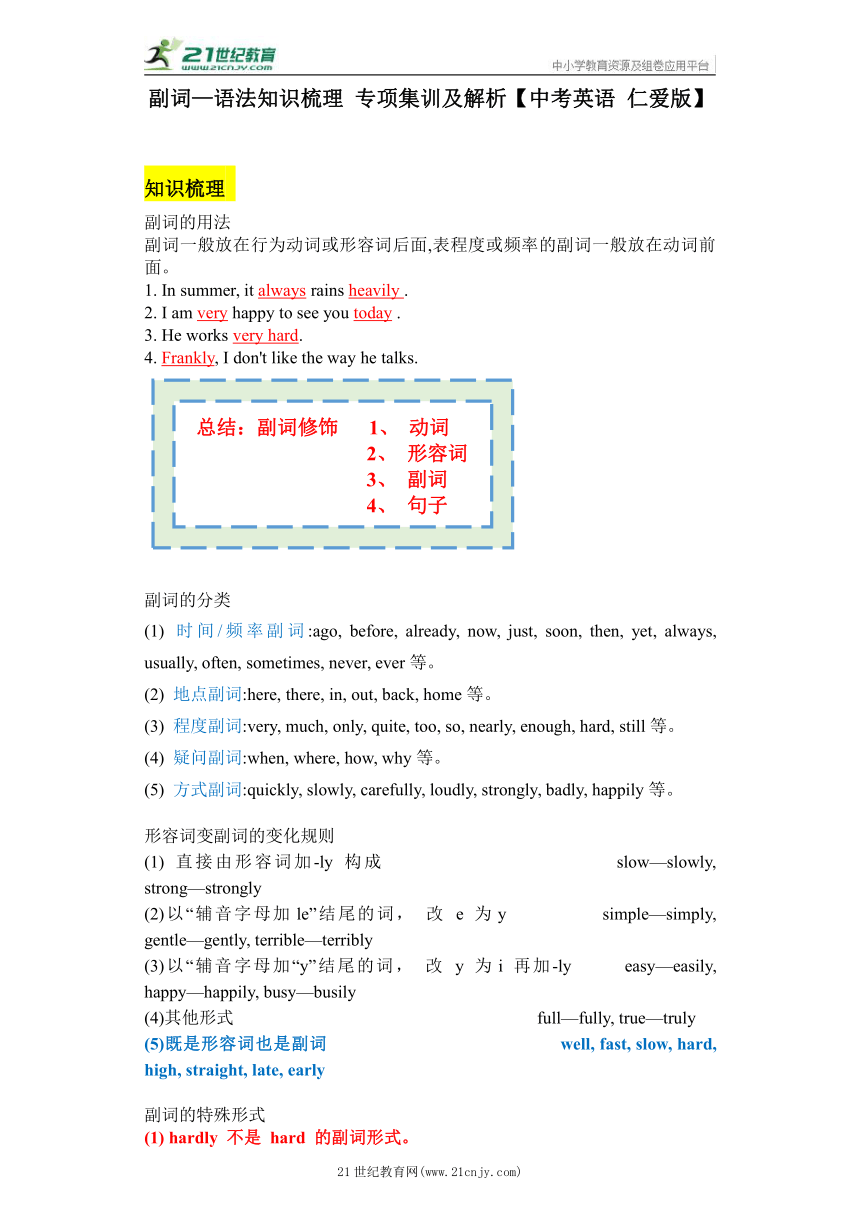 | |
| 格式 | docx | ||
| 文件大小 | 62.4KB | ||
| 资源类型 | 试卷 | ||
| 版本资源 | 仁爱科普版 | ||
| 科目 | 英语 | ||
| 更新时间 | 2024-01-29 12:27:36 | ||
图片预览

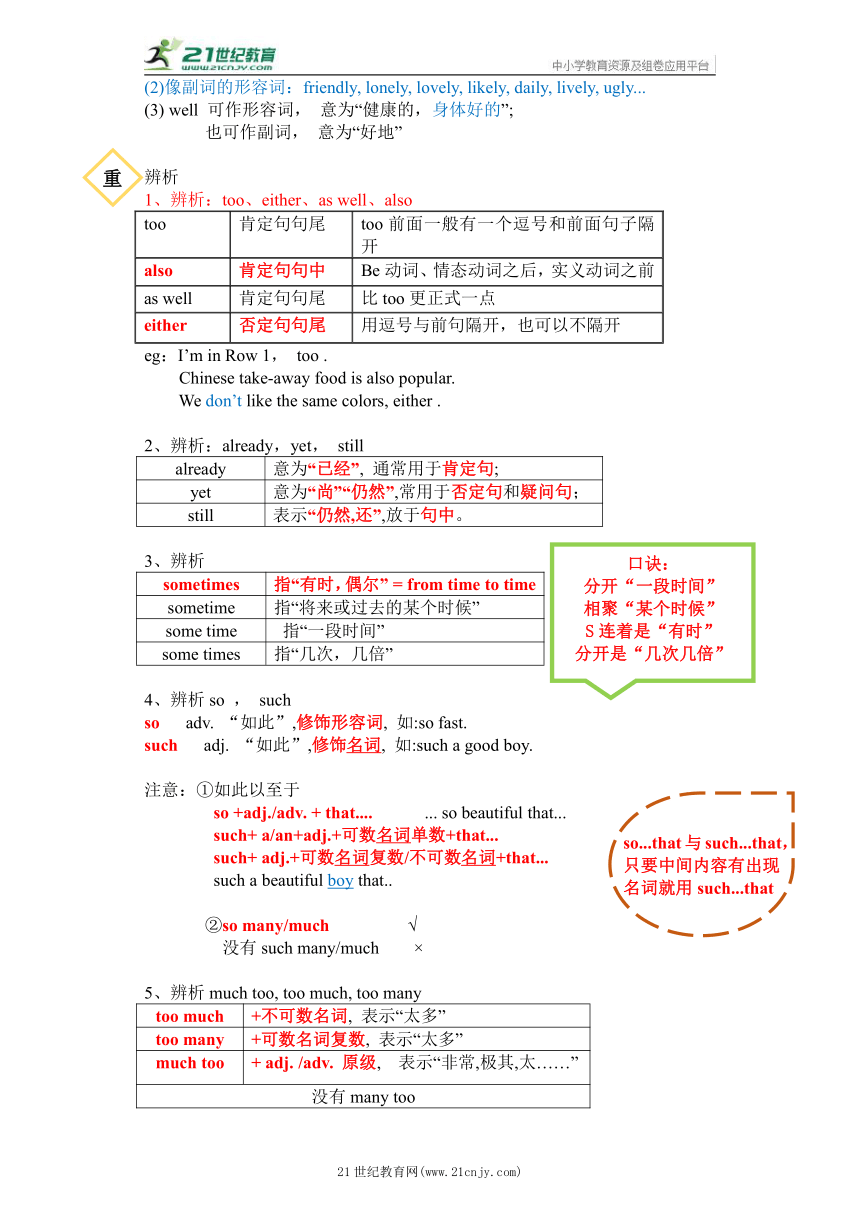
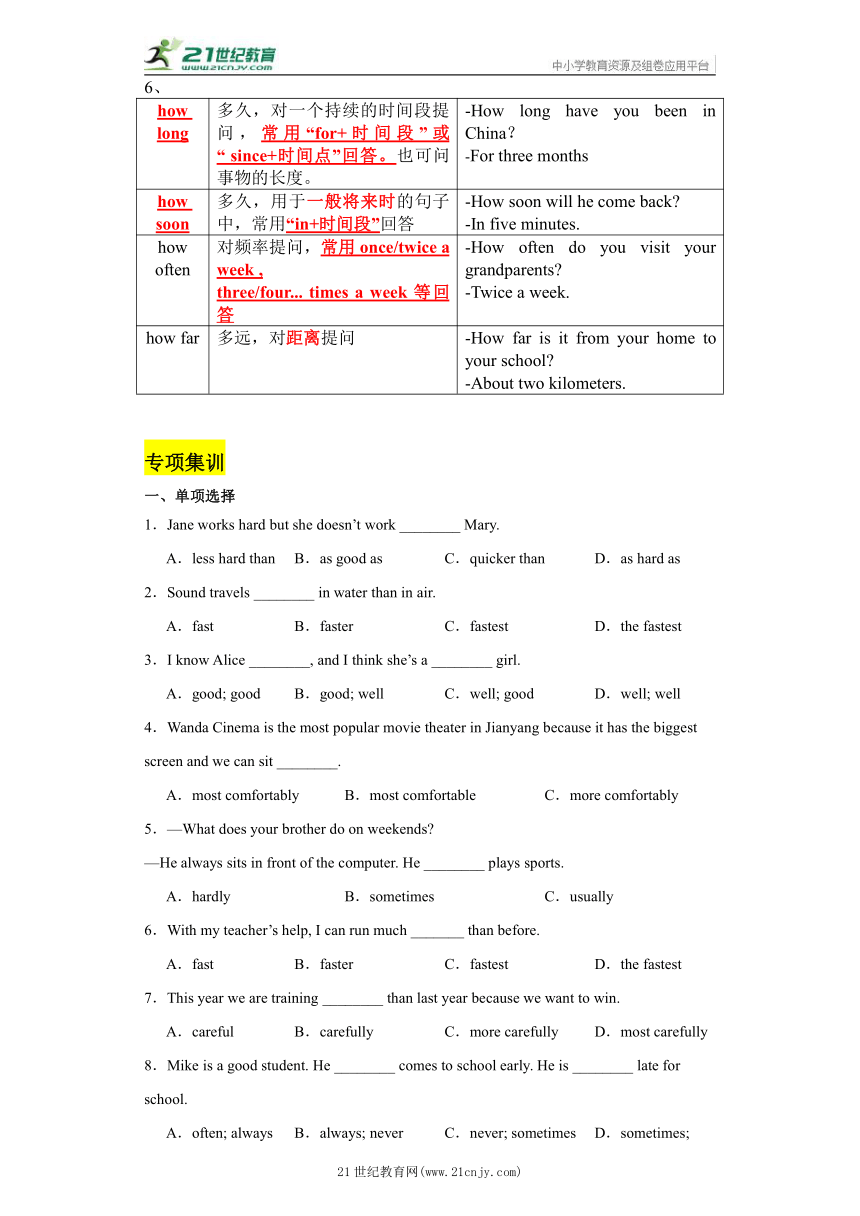
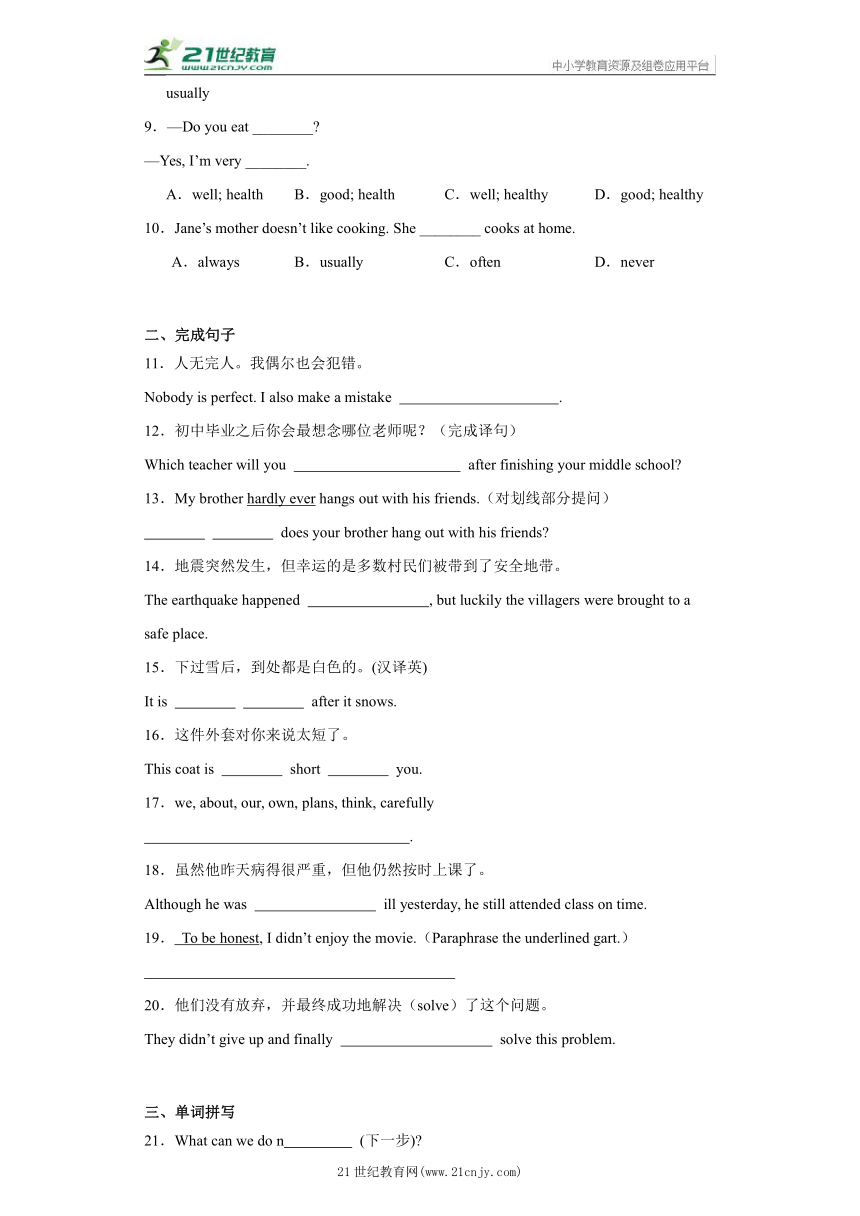
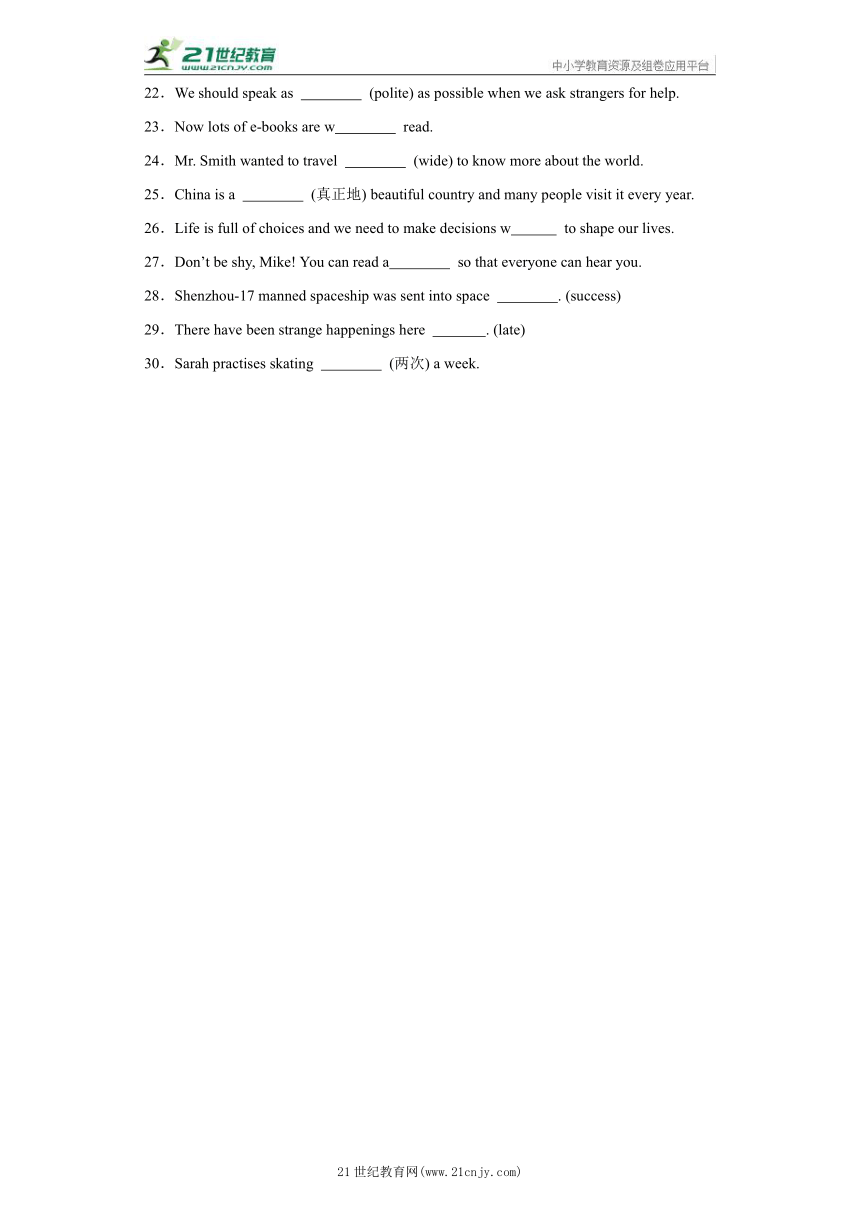
文档简介
副词—语法知识梳理 专项集训及解析【中考英语 仁爱版】
知识梳理
副词的用法
副词一般放在行为动词或形容词后面,表程度或频率的副词一般放在动词前面。
1. In summer, it always rains heavily .
2. I am very happy to see you today .
3. He works very hard.
4. Frankly, I don't like the way he talks.
总结:副词修饰 1、 动词
形容词
副词
句子
副词的分类
(1) 时间/频率副词:ago, before, already, now, just, soon, then, yet, always, usually, often, sometimes, never, ever等。
(2) 地点副词:here, there, in, out, back, home等。
(3) 程度副词:very, much, only, quite, too, so, nearly, enough, hard, still等。
(4) 疑问副词:when, where, how, why等。
(5) 方式副词:quickly, slowly, carefully, loudly, strongly, badly, happily等。
形容词变副词的变化规则
(1) 直接由形容词加-ly 构成 slow—slowly, strong—strongly
(2)以“辅音字母加le”结尾的词, 改 e 为y simple—simply, gentle—gently, terrible—terribly
(3)以“辅音字母加“y”结尾的词, 改 y 为i 再加-ly easy—easily, happy—happily, busy—busily
(4)其他形式 full—fully, true—truly
(5)既是形容词也是副词 well, fast, slow, hard, high, straight, late, early
副词的特殊形式
(1) hardly 不是 hard 的副词形式。
(2)像副词的形容词:friendly, lonely, lovely, likely, daily, lively, ugly...
(3) well 可作形容词, 意为“健康的,身体好的”;
也可作副词, 意为“好地”
辨析
1、辨析:too、either、as well、also
too 肯定句句尾 too前面一般有一个逗号和前面句子隔开
also 肯定句句中 Be动词、情态动词之后,实义动词之前
as well 肯定句句尾 比too更正式一点
either 否定句句尾 用逗号与前句隔开,也可以不隔开
eg:I’m in Row 1, too .
Chinese take-away food is also popular.
We don’t like the same colors, either .
2、辨析:already,yet, still
already 意为“已经”, 通常用于肯定句;
yet 意为“尚”“仍然”,常用于否定句和疑问句;
still 表示“仍然,还”,放于句中。
3、辨析
sometimes 指“有时,偶尔” = from time to time
sometime 指“将来或过去的某个时候”
some time 指“一段时间”
some times 指“几次,几倍”
4、辨析so , such
so adv. “如此”,修饰形容词, 如:so fast.
such adj. “如此”,修饰名词, 如:such a good boy.
注意:①如此以至于
so +adj./adv. + that.... ... so beautiful that...
such+ a/an+adj.+可数名词单数+that...
such+ adj.+可数名词复数/不可数名词+that...
such a beautiful boy that..
②so many/much √
没有such many/much ×
5、辨析much too, too much, too many
too much +不可数名词, 表示“太多”
too many +可数名词复数, 表示“太多”
much too + adj. /adv. 原级, 表示“非常,极其,太……”
没有many too
6、
how long 多久,对一个持续的时间段提问,常用“for+时间段”或“ since+时间点”回答。也可问事物的长度。 -How long have you been in China? -For three months
how soon 多久,用于一般将来时的句子中,常用“in+时间段”回答 -How soon will he come back -In five minutes.
how often 对频率提问,常用once/twice a week , three/four... times a week等回答 -How often do you visit your grandparents -Twice a week.
how far 多远,对距离提问 -How far is it from your home to your school -About two kilometers.
专项集训
一、单项选择
1.Jane works hard but she doesn’t work ________ Mary.
A.less hard than B.as good as C.quicker than D.as hard as
2.Sound travels ________ in water than in air.
A.fast B.faster C.fastest D.the fastest
3.I know Alice ________, and I think she’s a ________ girl.
A.good; good B.good; well C.well; good D.well; well
4.Wanda Cinema is the most popular movie theater in Jianyang because it has the biggest screen and we can sit ________.
A.most comfortably B.most comfortable C.more comfortably
5.—What does your brother do on weekends
—He always sits in front of the computer. He ________ plays sports.
A.hardly B.sometimes C.usually
6.With my teacher’s help, I can run much _______ than before.
A.fast B.faster C.fastest D.the fastest
7.This year we are training ________ than last year because we want to win.
A.careful B.carefully C.more carefully D.most carefully
8.Mike is a good student. He ________ comes to school early. He is ________ late for school.
A.often; always B.always; never C.never; sometimes D.sometimes; usually
9.—Do you eat ________
—Yes, I’m very ________.
A.well; health B.good; health C.well; healthy D.good; healthy
10.Jane’s mother doesn’t like cooking. She ________ cooks at home.
A.always B.usually C.often D.never
二、完成句子
11.人无完人。我偶尔也会犯错。
Nobody is perfect. I also make a mistake .
12.初中毕业之后你会最想念哪位老师呢?(完成译句)
Which teacher will you after finishing your middle school
13.My brother hardly ever hangs out with his friends.(对划线部分提问)
does your brother hang out with his friends
14.地震突然发生,但幸运的是多数村民们被带到了安全地带。
The earthquake happened , but luckily the villagers were brought to a safe place.
15.下过雪后,到处都是白色的。(汉译英)
It is after it snows.
16.这件外套对你来说太短了。
This coat is short you.
17.we, about, our, own, plans, think, carefully
.
18.虽然他昨天病得很严重,但他仍然按时上课了。
Although he was ill yesterday, he still attended class on time.
19. To be honest, I didn’t enjoy the movie.(Paraphrase the underlined gart.)
20.他们没有放弃,并最终成功地解决(solve)了这个问题。
They didn’t give up and finally solve this problem.
三、单词拼写
21.What can we do n (下一步)
22.We should speak as (polite) as possible when we ask strangers for help.
23.Now lots of e-books are w read.
24.Mr. Smith wanted to travel (wide) to know more about the world.
25.China is a (真正地) beautiful country and many people visit it every year.
26.Life is full of choices and we need to make decisions w to shape our lives.
27.Don’t be shy, Mike! You can read a so that everyone can hear you.
28.Shenzhou-17 manned spaceship was sent into space . (success)
29.There have been strange happenings here . (late)
30.Sarah practises skating (两次) a week.
21世纪教育网(www.21cnjy.com)
21世纪教育网(www.21cnjy.com)
参考答案:
1.D
【详解】句意:简工作很努力,但不如玛丽努力。
考查副词原级。less hard than不如……努力,比较级;as good as像……一样好,形容词;quicker than比……快,形容词;as hard as像……一样努力,副词。分析句子可知,横线上是副词修饰动词work,排除BC,由“Jane works hard but she doesn’t work”可知,表述的是不如玛丽,由于横线前有否定词,所以是as hard as。故选D。
2.B
【详解】句意:声音在水中比在空气中传播得快。
考查形副三级辨析。fast快地(原级);faster更快地(比较级);(the) fastest最快地(最高级)。根据句中“than”,可知空处应填副词比较级。故选B。
3.C
【详解】句意:我很了解爱丽丝,我认为她是个好女孩。
考查词义辨析。good好的,形容词;well好地,副词。第一空修饰动词,应用副词;第二空作定语修饰名词,应用形容词,故选C。
4.A
【详解】句意:万达电影院是简阳最受欢迎的电影院,因为它有最大的屏幕,我们坐得最舒服。
考查最高级和副词的用法。此处修饰动词sit用副词;根据“because it has the biggest screen and we can sit”可知此处指坐得最舒服,用副词的最高级。故选A。
5.A
【详解】句意:——你的哥哥在周末做什么?——他总是坐在电脑前面。他几乎不运动。
考查频度副词辨析。hardly几乎不;sometimes有时;usually通常。根据“He always sits in front of the computer.”可知,他总是坐在电脑前面,因此他很少运动。故选A。
6.B
【详解】句意:在老师的帮助下,我比以前跑得快多了。
考查副词比较级。根据“than before”可知考查比较级,修饰动词“run”用副词fast比较级faster。故选B。
7.C
【详解】句意:今年我们比去年训练更认真,因为我们想赢。
考查比较级的用法。careful认真的;carefully认真地;more carefully更认真地;most carefully最认真地(最高级)。根据“This year we are training…than”可知,空处应该用副词的比较级修饰动词。故选C。
8.B
【详解】句意:Mike是一个好学生。他总是很早来学校。他上学从不迟到。
考查副词辨析。often经常;always总是;never从不;sometimes有时;usually通常。根据“Mike is a good student.”可知好学生应该不迟到,而是早到学校。B选项符合。故选B。
9.C
【详解】句意:——你吃得好吗?——是的,我非常健康。
考查单词辨析。well好地,副词/形容词;good好的,形容词;health健康,名词;healthy健康的,形容词。根据“Do you eat…”可知,此处修饰动词eat,应该用副词形式,故第一空填well。根据“I’m very…”可知,第二空应该填形容词作表语,healthy符合题意。故选C。
10.D
【详解】句意:简的妈妈不喜欢做饭。她从不在家做饭。
考查频率副词。always总是;usually通常;often经常;never从不。根据前文“Jane’s mother doesn’t like cooking.” 可知,不喜欢做饭,所以是从不在家做饭。故选D。
11.once in a while/now and then/occasionally
【详解】根据中英文对照可知,英文句子缺少“偶尔”,英文表达是once in a while、now and then或者occasionally,故填once in a while/now and then/occasionally。
12.miss most
【详解】根据中英文对照可知,空处缺少了“最想念”,miss“想念”,助动词will后面加动词原形,most“最……”, 副词最高级。故填miss most。
13. How often
【详解】句意:我哥哥几乎从不和他的朋友出去玩。根据划线部分hardly ever表示“几乎不”可知,此处是对频率进行提问,how often表示“多久一次”,how位于句首,首字母要大写。故填How;often。
14.all of a sudden/suddenly
【详解】“突然”可用副词词组all of a sudden或副词suddenly,修饰动词happened。故填all of a sudden/suddenly。
15. white everywhere
【详解】white“白色的”,形容词作表语;everywhere“到处”,地点副词。故填white;everywhere。
16. too for
【详解】根据中英文对照可知,too“太”,副词修饰形容词short;for you“对你来说”。故填too;for。
17.We think carefully about our own plans
【详解】根据分析所给单词可知应用陈述句的形式。其中we作主语;think about作谓语;副词carefully修饰think about;our own plan作宾语。故填We think carefully about our own plans“我们仔细考虑我们自己的计划”。
18.badly/seriously
【详解】根据中英文提示,可知英文句中缺少“很严重”部分;分析句子,可知空处应填副词修饰形容词ill,副词badly/seriously可修饰ill,表示“病得很严重”。故填badly/seriously。
19.Honestly, I didn’t enjoy the movie./Honestly speaking, I didn’t enjoy the movie.
【详解】句意:老实说,我不喜欢这部电影。根据要求以及“To be honest”可知,To be honest,意为“老实说”,等于Honestly/Honestly speaking。故填Honestly/Honestly speaking, I didn’t enjoy the movie.
20.succeeded in solving/successfully solved/were successful in solving
【详解】solve“解决”。表示“成功”可以用动词succeed,副词successfully和形容词successful。succeed in doing表示“成功做某事”,solve用动名词形式;用副词successfully时,应该修饰动词solve;用形容词successful时,用短语be successful in doing结构,solve用动名词形式。根据题干可知,句子是一般过去时,动词用过去式,主语是复数,这里的be动词用were。故填succeeded in solving/successfully solved/were successful in solving。
21.(n)ext
【详解】句意:我们下一步能做什么?根据汉语及首字母提示,应填next“下一步,紧接着”,副词。故填(n)ext。
22.politely
【详解】句意:当我们向陌生人求助时,我们应该尽可能礼貌地说话。polite“礼貌的”,形容词;此处用来修饰动词speak,应该用副词politely“礼貌地”,as...as中间用形容词或副词原级。故填politely。
23.(w)idely
【详解】句意:现在很多电子书被广泛阅读。根据“Now lots of e-books are…read.”和首字母提示可知,许多电子书被广泛阅读。widely意为“广泛地”,副词修饰动词read。故填(w)idely。
24.widely
【详解】句意:史密斯先生想广泛旅行以了解世界。wide“广泛的”,形容词。分析句子可知,此处应用副词修饰动词travel。故填widely。
25.really
【详解】句意:中国是一个非常美丽的国家,每年都有很多人去旅游。really“真正地”,副词修饰形容词beautiful,故填really。
26.(w)isely
【详解】句意:生活充满了选择,我们需要明智地做出决定来塑造我们的生活。根据“make decisions...to shape our lives”及首字母提示可知,这里指明智地做出决定,“明智地”为wisely,是副词修饰动词make。故填(w)isely。
27.(a)loud
【详解】句意:别害羞,迈克!你可以大声朗读,这样每个人都能听到。根据“You can read …so that everyone can hear you.”及首字母可知,大声朗读,每个人才能听到,aloud修饰动词read,故填(a)loud。
28.successfully
【详解】句意:神舟十七号载人飞船成功发射升空。根据“Shenzhou-17 manned spaceship was sent into space...”和所给单词提示可知,空处应用副词successfully“成功地”,修饰谓语“was sent”。故填successfully。
29.lately
【详解】句意:最近这里发生了一些奇怪的事情。late, 形容词。句子中修饰动词使用副词形式lately。故填lately。
30.twice
【详解】句意:萨拉每周练习两次滑冰。“两次”为twice,twice a week意为“一周两次”,故填twice。
21世纪教育网(www.21cnjy.com)
21世纪教育网(www.21cnjy.com)
知识梳理
副词的用法
副词一般放在行为动词或形容词后面,表程度或频率的副词一般放在动词前面。
1. In summer, it always rains heavily .
2. I am very happy to see you today .
3. He works very hard.
4. Frankly, I don't like the way he talks.
总结:副词修饰 1、 动词
形容词
副词
句子
副词的分类
(1) 时间/频率副词:ago, before, already, now, just, soon, then, yet, always, usually, often, sometimes, never, ever等。
(2) 地点副词:here, there, in, out, back, home等。
(3) 程度副词:very, much, only, quite, too, so, nearly, enough, hard, still等。
(4) 疑问副词:when, where, how, why等。
(5) 方式副词:quickly, slowly, carefully, loudly, strongly, badly, happily等。
形容词变副词的变化规则
(1) 直接由形容词加-ly 构成 slow—slowly, strong—strongly
(2)以“辅音字母加le”结尾的词, 改 e 为y simple—simply, gentle—gently, terrible—terribly
(3)以“辅音字母加“y”结尾的词, 改 y 为i 再加-ly easy—easily, happy—happily, busy—busily
(4)其他形式 full—fully, true—truly
(5)既是形容词也是副词 well, fast, slow, hard, high, straight, late, early
副词的特殊形式
(1) hardly 不是 hard 的副词形式。
(2)像副词的形容词:friendly, lonely, lovely, likely, daily, lively, ugly...
(3) well 可作形容词, 意为“健康的,身体好的”;
也可作副词, 意为“好地”
辨析
1、辨析:too、either、as well、also
too 肯定句句尾 too前面一般有一个逗号和前面句子隔开
also 肯定句句中 Be动词、情态动词之后,实义动词之前
as well 肯定句句尾 比too更正式一点
either 否定句句尾 用逗号与前句隔开,也可以不隔开
eg:I’m in Row 1, too .
Chinese take-away food is also popular.
We don’t like the same colors, either .
2、辨析:already,yet, still
already 意为“已经”, 通常用于肯定句;
yet 意为“尚”“仍然”,常用于否定句和疑问句;
still 表示“仍然,还”,放于句中。
3、辨析
sometimes 指“有时,偶尔” = from time to time
sometime 指“将来或过去的某个时候”
some time 指“一段时间”
some times 指“几次,几倍”
4、辨析so , such
so adv. “如此”,修饰形容词, 如:so fast.
such adj. “如此”,修饰名词, 如:such a good boy.
注意:①如此以至于
so +adj./adv. + that.... ... so beautiful that...
such+ a/an+adj.+可数名词单数+that...
such+ adj.+可数名词复数/不可数名词+that...
such a beautiful boy that..
②so many/much √
没有such many/much ×
5、辨析much too, too much, too many
too much +不可数名词, 表示“太多”
too many +可数名词复数, 表示“太多”
much too + adj. /adv. 原级, 表示“非常,极其,太……”
没有many too
6、
how long 多久,对一个持续的时间段提问,常用“for+时间段”或“ since+时间点”回答。也可问事物的长度。 -How long have you been in China? -For three months
how soon 多久,用于一般将来时的句子中,常用“in+时间段”回答 -How soon will he come back -In five minutes.
how often 对频率提问,常用once/twice a week , three/four... times a week等回答 -How often do you visit your grandparents -Twice a week.
how far 多远,对距离提问 -How far is it from your home to your school -About two kilometers.
专项集训
一、单项选择
1.Jane works hard but she doesn’t work ________ Mary.
A.less hard than B.as good as C.quicker than D.as hard as
2.Sound travels ________ in water than in air.
A.fast B.faster C.fastest D.the fastest
3.I know Alice ________, and I think she’s a ________ girl.
A.good; good B.good; well C.well; good D.well; well
4.Wanda Cinema is the most popular movie theater in Jianyang because it has the biggest screen and we can sit ________.
A.most comfortably B.most comfortable C.more comfortably
5.—What does your brother do on weekends
—He always sits in front of the computer. He ________ plays sports.
A.hardly B.sometimes C.usually
6.With my teacher’s help, I can run much _______ than before.
A.fast B.faster C.fastest D.the fastest
7.This year we are training ________ than last year because we want to win.
A.careful B.carefully C.more carefully D.most carefully
8.Mike is a good student. He ________ comes to school early. He is ________ late for school.
A.often; always B.always; never C.never; sometimes D.sometimes; usually
9.—Do you eat ________
—Yes, I’m very ________.
A.well; health B.good; health C.well; healthy D.good; healthy
10.Jane’s mother doesn’t like cooking. She ________ cooks at home.
A.always B.usually C.often D.never
二、完成句子
11.人无完人。我偶尔也会犯错。
Nobody is perfect. I also make a mistake .
12.初中毕业之后你会最想念哪位老师呢?(完成译句)
Which teacher will you after finishing your middle school
13.My brother hardly ever hangs out with his friends.(对划线部分提问)
does your brother hang out with his friends
14.地震突然发生,但幸运的是多数村民们被带到了安全地带。
The earthquake happened , but luckily the villagers were brought to a safe place.
15.下过雪后,到处都是白色的。(汉译英)
It is after it snows.
16.这件外套对你来说太短了。
This coat is short you.
17.we, about, our, own, plans, think, carefully
.
18.虽然他昨天病得很严重,但他仍然按时上课了。
Although he was ill yesterday, he still attended class on time.
19. To be honest, I didn’t enjoy the movie.(Paraphrase the underlined gart.)
20.他们没有放弃,并最终成功地解决(solve)了这个问题。
They didn’t give up and finally solve this problem.
三、单词拼写
21.What can we do n (下一步)
22.We should speak as (polite) as possible when we ask strangers for help.
23.Now lots of e-books are w read.
24.Mr. Smith wanted to travel (wide) to know more about the world.
25.China is a (真正地) beautiful country and many people visit it every year.
26.Life is full of choices and we need to make decisions w to shape our lives.
27.Don’t be shy, Mike! You can read a so that everyone can hear you.
28.Shenzhou-17 manned spaceship was sent into space . (success)
29.There have been strange happenings here . (late)
30.Sarah practises skating (两次) a week.
21世纪教育网(www.21cnjy.com)
21世纪教育网(www.21cnjy.com)
参考答案:
1.D
【详解】句意:简工作很努力,但不如玛丽努力。
考查副词原级。less hard than不如……努力,比较级;as good as像……一样好,形容词;quicker than比……快,形容词;as hard as像……一样努力,副词。分析句子可知,横线上是副词修饰动词work,排除BC,由“Jane works hard but she doesn’t work”可知,表述的是不如玛丽,由于横线前有否定词,所以是as hard as。故选D。
2.B
【详解】句意:声音在水中比在空气中传播得快。
考查形副三级辨析。fast快地(原级);faster更快地(比较级);(the) fastest最快地(最高级)。根据句中“than”,可知空处应填副词比较级。故选B。
3.C
【详解】句意:我很了解爱丽丝,我认为她是个好女孩。
考查词义辨析。good好的,形容词;well好地,副词。第一空修饰动词,应用副词;第二空作定语修饰名词,应用形容词,故选C。
4.A
【详解】句意:万达电影院是简阳最受欢迎的电影院,因为它有最大的屏幕,我们坐得最舒服。
考查最高级和副词的用法。此处修饰动词sit用副词;根据“because it has the biggest screen and we can sit”可知此处指坐得最舒服,用副词的最高级。故选A。
5.A
【详解】句意:——你的哥哥在周末做什么?——他总是坐在电脑前面。他几乎不运动。
考查频度副词辨析。hardly几乎不;sometimes有时;usually通常。根据“He always sits in front of the computer.”可知,他总是坐在电脑前面,因此他很少运动。故选A。
6.B
【详解】句意:在老师的帮助下,我比以前跑得快多了。
考查副词比较级。根据“than before”可知考查比较级,修饰动词“run”用副词fast比较级faster。故选B。
7.C
【详解】句意:今年我们比去年训练更认真,因为我们想赢。
考查比较级的用法。careful认真的;carefully认真地;more carefully更认真地;most carefully最认真地(最高级)。根据“This year we are training…than”可知,空处应该用副词的比较级修饰动词。故选C。
8.B
【详解】句意:Mike是一个好学生。他总是很早来学校。他上学从不迟到。
考查副词辨析。often经常;always总是;never从不;sometimes有时;usually通常。根据“Mike is a good student.”可知好学生应该不迟到,而是早到学校。B选项符合。故选B。
9.C
【详解】句意:——你吃得好吗?——是的,我非常健康。
考查单词辨析。well好地,副词/形容词;good好的,形容词;health健康,名词;healthy健康的,形容词。根据“Do you eat…”可知,此处修饰动词eat,应该用副词形式,故第一空填well。根据“I’m very…”可知,第二空应该填形容词作表语,healthy符合题意。故选C。
10.D
【详解】句意:简的妈妈不喜欢做饭。她从不在家做饭。
考查频率副词。always总是;usually通常;often经常;never从不。根据前文“Jane’s mother doesn’t like cooking.” 可知,不喜欢做饭,所以是从不在家做饭。故选D。
11.once in a while/now and then/occasionally
【详解】根据中英文对照可知,英文句子缺少“偶尔”,英文表达是once in a while、now and then或者occasionally,故填once in a while/now and then/occasionally。
12.miss most
【详解】根据中英文对照可知,空处缺少了“最想念”,miss“想念”,助动词will后面加动词原形,most“最……”, 副词最高级。故填miss most。
13. How often
【详解】句意:我哥哥几乎从不和他的朋友出去玩。根据划线部分hardly ever表示“几乎不”可知,此处是对频率进行提问,how often表示“多久一次”,how位于句首,首字母要大写。故填How;often。
14.all of a sudden/suddenly
【详解】“突然”可用副词词组all of a sudden或副词suddenly,修饰动词happened。故填all of a sudden/suddenly。
15. white everywhere
【详解】white“白色的”,形容词作表语;everywhere“到处”,地点副词。故填white;everywhere。
16. too for
【详解】根据中英文对照可知,too“太”,副词修饰形容词short;for you“对你来说”。故填too;for。
17.We think carefully about our own plans
【详解】根据分析所给单词可知应用陈述句的形式。其中we作主语;think about作谓语;副词carefully修饰think about;our own plan作宾语。故填We think carefully about our own plans“我们仔细考虑我们自己的计划”。
18.badly/seriously
【详解】根据中英文提示,可知英文句中缺少“很严重”部分;分析句子,可知空处应填副词修饰形容词ill,副词badly/seriously可修饰ill,表示“病得很严重”。故填badly/seriously。
19.Honestly, I didn’t enjoy the movie./Honestly speaking, I didn’t enjoy the movie.
【详解】句意:老实说,我不喜欢这部电影。根据要求以及“To be honest”可知,To be honest,意为“老实说”,等于Honestly/Honestly speaking。故填Honestly/Honestly speaking, I didn’t enjoy the movie.
20.succeeded in solving/successfully solved/were successful in solving
【详解】solve“解决”。表示“成功”可以用动词succeed,副词successfully和形容词successful。succeed in doing表示“成功做某事”,solve用动名词形式;用副词successfully时,应该修饰动词solve;用形容词successful时,用短语be successful in doing结构,solve用动名词形式。根据题干可知,句子是一般过去时,动词用过去式,主语是复数,这里的be动词用were。故填succeeded in solving/successfully solved/were successful in solving。
21.(n)ext
【详解】句意:我们下一步能做什么?根据汉语及首字母提示,应填next“下一步,紧接着”,副词。故填(n)ext。
22.politely
【详解】句意:当我们向陌生人求助时,我们应该尽可能礼貌地说话。polite“礼貌的”,形容词;此处用来修饰动词speak,应该用副词politely“礼貌地”,as...as中间用形容词或副词原级。故填politely。
23.(w)idely
【详解】句意:现在很多电子书被广泛阅读。根据“Now lots of e-books are…read.”和首字母提示可知,许多电子书被广泛阅读。widely意为“广泛地”,副词修饰动词read。故填(w)idely。
24.widely
【详解】句意:史密斯先生想广泛旅行以了解世界。wide“广泛的”,形容词。分析句子可知,此处应用副词修饰动词travel。故填widely。
25.really
【详解】句意:中国是一个非常美丽的国家,每年都有很多人去旅游。really“真正地”,副词修饰形容词beautiful,故填really。
26.(w)isely
【详解】句意:生活充满了选择,我们需要明智地做出决定来塑造我们的生活。根据“make decisions...to shape our lives”及首字母提示可知,这里指明智地做出决定,“明智地”为wisely,是副词修饰动词make。故填(w)isely。
27.(a)loud
【详解】句意:别害羞,迈克!你可以大声朗读,这样每个人都能听到。根据“You can read …so that everyone can hear you.”及首字母可知,大声朗读,每个人才能听到,aloud修饰动词read,故填(a)loud。
28.successfully
【详解】句意:神舟十七号载人飞船成功发射升空。根据“Shenzhou-17 manned spaceship was sent into space...”和所给单词提示可知,空处应用副词successfully“成功地”,修饰谓语“was sent”。故填successfully。
29.lately
【详解】句意:最近这里发生了一些奇怪的事情。late, 形容词。句子中修饰动词使用副词形式lately。故填lately。
30.twice
【详解】句意:萨拉每周练习两次滑冰。“两次”为twice,twice a week意为“一周两次”,故填twice。
21世纪教育网(www.21cnjy.com)
21世纪教育网(www.21cnjy.com)
同课章节目录
- 词法
- 名词
- 动词和动词短语
- 动词语态
- 动词时态
- 助动词和情态动词
- 非谓语动词
- 冠词
- 代词
- 数词和量词
- 形容词副词及其比较等级
- 介词和介词短语
- 连词和感叹词
- 构词法
- 相似、相近词比较
- 句法
- 陈述句
- 一般疑问句和否定疑问句
- 特殊疑问句及选择疑问句
- 反意疑问句
- 存在句(There be句型)
- 宾语从句
- 定语从句
- 状语从句
- 主谓一致问题
- 简单句
- 并列句
- 复合句
- 主谓一致
- 主、表语从句
- 名词性从句
- 直接引语和间接引语
- 虚拟语气
- 感叹句
- 强调句
- 倒装句
- 祈使句
- 句子的成分
- 句子的分类
- 题型专区
- 单项选择部分
- 易错题
- 完形填空
- 阅读理解
- 词汇练习
- 听说训练
- 句型转换
- 补全对话
- 短文改错
- 翻译
- 书面表达
- 任务型阅读
- 语法填空
- 其他资料
